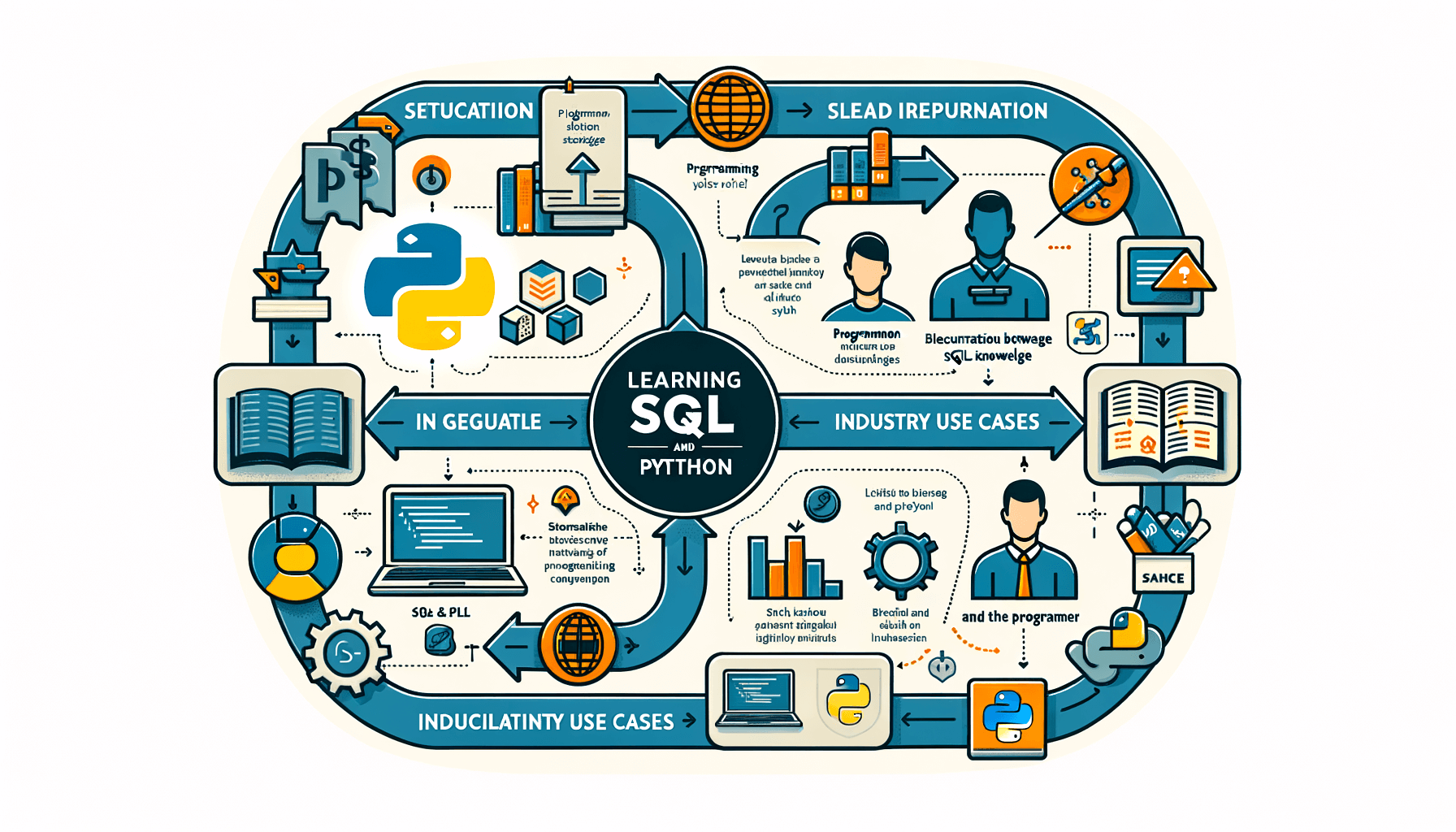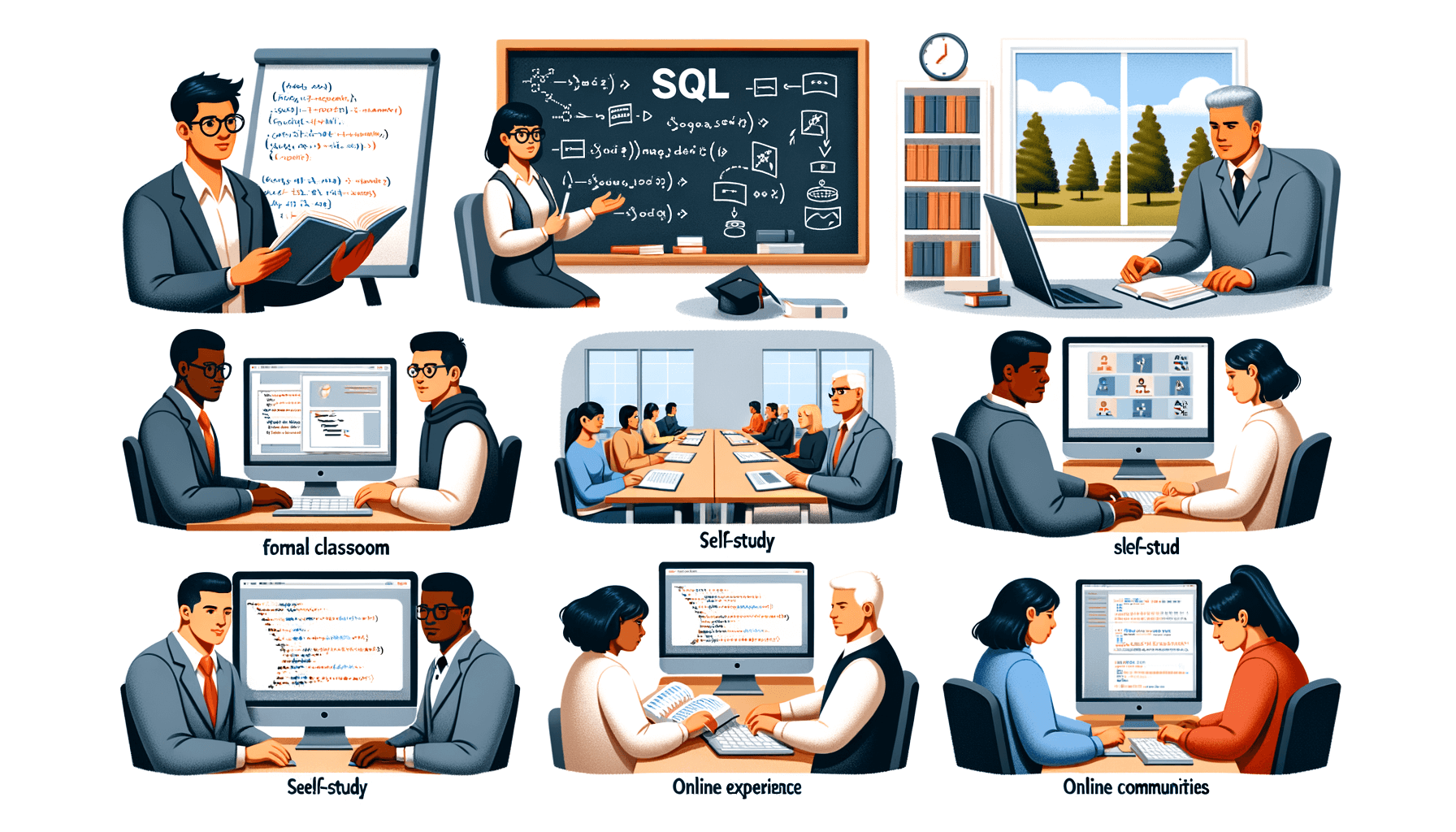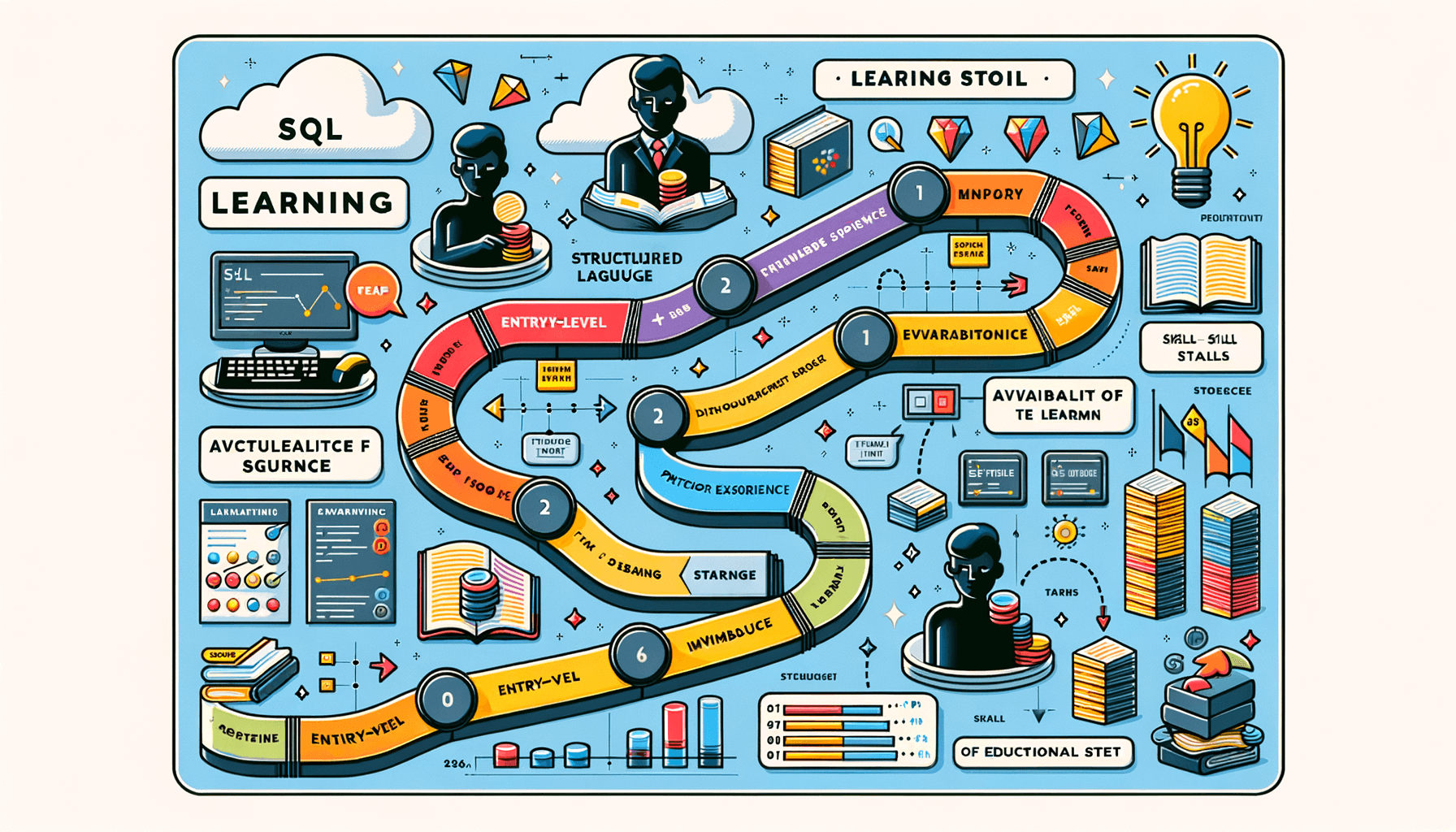A big variety of articles and resources

Can a programmer master SQL in a week?
 Sia Author and Instructor
Learn SQL
Sia Author and Instructor
Learn SQL
13 minute read
Many wonder if it's possible to master SQL in just a week. SQL, which stands for Structured Query Language, is a tool used to manage and manipulate databases. This article will explore what it takes to learn SQL quickly, covering basic concepts, practical uses, and advanced techniques.
Key Takeaways
- SQL is a language used to interact with databases.
- Understanding basic SQL commands is essential for beginners.
- Practical experience is key to mastering SQL.
- Advanced techniques like subqueries and joins can be challenging but are important.
- Regular practice and real-world projects help solidify SQL skills.
Understanding the Basics of SQL
Defining SQL and Its Importance
Structured Query Language, or SQL, is a standard language for managing and manipulating databases. It's crucial for anyone working with data because it allows us to interact with databases efficiently. SQL is used in various fields, from business to science, making it a versatile tool.
Key Components of SQL
SQL consists of several key components that help us perform different tasks. These include:
- Data Definition Language (DDL): Used to define and modify database structures.
- Data Manipulation Language (DML): Allows us to insert, update, delete, and retrieve data.
- Data Control Language (DCL): Manages access to the data.
- Transaction Control Language (TCL): Ensures data integrity during transactions.
Common SQL Commands
Some of the most common SQL commands we use include:
- SELECT: Retrieves data from a database.
- INSERT: Adds new data to a database.
- UPDATE: Modifies existing data.
- DELETE: Removes data from a database.
Mastering these basic commands is essential for anyone looking to work with databases. Websites like sqlskillz.com vs w3schools.com offer great resources to learn these commands at your own pace.
Theoretical Foundations of SQL
Relational Database Concepts
Understanding relational databases is crucial for mastering SQL. These databases store data in tables, which are organized into rows and columns. Each table represents a different entity, and relationships between tables are established through keys. This structure allows for efficient data retrieval and manipulation.
Data Types and Schemas
In SQL, data types define the kind of data that can be stored in a table's columns. Common data types include integers, strings, and dates. Schemas, on the other hand, are blueprints of the database, outlining how tables are structured and related. Choosing the right data type is essential for optimizing storage and performance.
Normalization and Denormalization
Normalization is the process of organizing data to reduce redundancy and improve integrity. It involves dividing large tables into smaller ones and defining relationships between them. Denormalization, however, is the opposite; it combines tables to improve read performance. Both techniques have their pros and cons, and the choice depends on the specific use case.
Mastering these theoretical foundations is key to becoming proficient in SQL. They provide the necessary background to understand more advanced concepts and practical applications.
Practical Applications of SQL
Writing Basic Queries
When we start learning SQL, the first thing we do is write basic queries. These queries help us fetch data from databases. Understanding how to write these queries is crucial because it forms the foundation of more complex operations. We often begin with simple commands like SELECT, INSERT, UPDATE, and DELETE.
Using SQL for Data Manipulation
SQL is not just about reading data; it's also about changing it. We use SQL to add, update, or remove data in a database. This is where commands like INSERT INTO, UPDATE, and DELETE come into play. These commands allow us to keep our data current and accurate.
Implementing SQL in Real-World Scenarios
In real-world situations, we use SQL to solve practical problems. For example, a company might use SQL to analyze sales data and make business decisions. We can also use SQL to manage user information in a web application. The skills we gain from hands-on projects and expert-led training are invaluable. This practical experience helps us understand how to apply SQL in various scenarios.
Gaining practical SQL skills with real-world problems is essential for becoming proficient. Hands-on projects and expert-led training can make a significant difference in our learning journey.
Advanced SQL Techniques
Subqueries and Nested Queries
Subqueries and nested queries are powerful tools in SQL that allow us to perform complex operations within a single query. These techniques enable us to break down complicated problems into smaller, more manageable parts. Mastering subqueries can significantly enhance our ability to retrieve specific data.
Joins and Unions
Joins and unions are essential for combining data from multiple tables. While joins merge rows based on a related column, unions stack rows from different queries. Understanding the differences and applications of each can help us manipulate data more effectively.
Stored Procedures and Functions
Stored procedures and functions are reusable blocks of code that can be called to perform specific tasks. These are particularly useful for repetitive operations and can help in maintaining cleaner and more efficient code. Learning to write and use stored procedures can save us a lot of time and effort in the long run.
Advanced SQL techniques are crucial for anyone looking to deepen their understanding and capability in SQL. They not only make our queries more efficient but also open up new possibilities for data manipulation and analysis.
SQL Performance Optimization
Indexing Strategies
When we talk about SQL performance, indexing is a key factor. Indexes help databases find data faster, much like an index in a book. Proper indexing can drastically improve query speed. However, too many indexes can slow down data insertion and updates. It's a balancing act.
Query Optimization Techniques
Optimizing queries is essential for efficient database performance. We should always aim to write queries that are both simple and effective. Using tools like the sqlmicro course can help us learn the best practices for query optimization. Breaking down complex queries into smaller, manageable parts can also make a big difference.
Understanding Execution Plans
Execution plans show us how SQL queries are executed by the database engine. By analyzing these plans, we can identify bottlenecks and areas for improvement. This step is crucial for fine-tuning our queries and ensuring they run as efficiently as possible.
Remember, mastering SQL performance optimization is a continuous process. Regularly reviewing and refining our strategies will lead to better, faster databases.
SQL Security Best Practices
User Authentication and Authorization
When it comes to SQL security, user authentication and authorization are crucial. We need to ensure that only authorized users can access the database. This involves setting up strong passwords and using multi-factor authentication. Additionally, we should assign roles and permissions carefully to limit access to sensitive data.
SQL Injection Prevention
SQL injection is a common attack where malicious code is inserted into SQL queries. To prevent this, we must use prepared statements and parameterized queries. It's also important to validate user inputs and sanitize data before processing it. Regularly updating and patching the database system can also help mitigate these risks.
Data Encryption Methods
Encrypting data is essential for protecting sensitive information. We should use encryption for data at rest and in transit. This means encrypting the database files and using SSL/TLS for data transmission. By doing so, we can ensure that even if data is intercepted, it remains unreadable to unauthorized users.
Ensuring SQL security is not just about protecting data but also about maintaining the trust of users and stakeholders. By following these best practices, we can create a secure and reliable database environment.
SQL Tools and Resources
When we embark on our journey to learn SQL, having the right tools and resources can make a significant difference. There are many options available that cater to different learning styles and needs.
-
Popular SQL Management Tools: These tools help us write and manage our SQL queries effectively. Some of the most widely used tools include:
- MySQL Workbench
- SQL Server Management Studio (SSMS)
- pgAdmin for PostgreSQL
-
Online Learning Platforms: We can find numerous platforms that offer courses on SQL. Some notable ones are:
- Coursera
- Udemy
- Khan Academy
-
Community and Support Resources: Engaging with a community can enhance our learning experience. We can join forums like Stack Overflow or Reddit, where we can ask questions and share knowledge.
In addition to these resources, we should consider the zero to mysql junior dba course, which offers practical SQL training with real-world problem-solving. Instructor Eric Vanier brings 25 years of expertise in MySQL performance optimization.
By utilizing these tools and resources, we can significantly improve our SQL skills and confidence.
In summary, the right combination of tools, courses, and community support can help us master SQL more effectively and efficiently.
Challenges in Learning SQL
Common Pitfalls for Beginners
When starting with SQL, beginners often face several hurdles. One of the most common issues is understanding the syntax. SQL has a unique structure that can be confusing at first. It's easy to make mistakes with commas, quotation marks, and other punctuation. Another challenge is grasping the concept of relational databases. Many new learners struggle to understand how tables relate to each other and how to join them effectively.
Overcoming Learning Plateaus
As we progress in our SQL journey, we might hit learning plateaus. These are times when it feels like we're not making any progress. To overcome these, it's important to practice regularly and seek out new challenges. Working on real-world projects or solving complex queries can help us break through these plateaus. Additionally, joining a community of learners can provide support and motivation.
Balancing Theory and Practice
Finding the right balance between theory and practice is crucial in mastering SQL. While it's important to understand the theoretical foundations, practical application is equally important. We should spend time writing queries and working with databases to reinforce our learning. A good approach is to learn a concept and then immediately apply it in a practical scenario. This helps solidify our understanding and makes the learning process more engaging.
Learning SQL can be challenging, but with persistence and the right approach, we can overcome these obstacles and become proficient in this essential skill.
Evaluating Mastery of SQL
Self-Assessment Techniques
To gauge our SQL skills, we can use self-assessment techniques. One effective method is to create a small project that involves writing queries and manipulating data. This helps us see where we stand and what areas need improvement. Regular practice is key to mastering SQL.
Certifications and Exams
Certifications can be a good way to show our SQL knowledge. Websites like sqlskillz.com vs udemy.com offer courses that help us prepare for these exams. These platforms are perfect for beginners and allow us to learn at our own pace. No credit card is required to start learning.
Real-World Project Applications
Applying SQL in real-world projects is the best way to test our skills. We can work on projects that require data analysis, report generation, or database management. This hands-on experience is invaluable and helps us understand how SQL is used in practical scenarios.
Working on real-world projects not only tests our skills but also boosts our confidence in using SQL effectively.
Comparing SQL with Other Query Languages
When we compare SQL with other query languages, we see that each has its own strengths and weaknesses. SQL is a powerful tool for managing and querying relational databases, but it may not always be the best choice for every situation.
SQL vs. NoSQL
NoSQL databases are designed to handle large volumes of unstructured data. Unlike SQL, which uses tables, NoSQL databases use various data models like document, key-value, graph, and column-family. This makes NoSQL more flexible for certain types of applications, such as real-time web apps and big data analytics.
GraphQL and Other Alternatives
GraphQL is another query language that offers a different approach. It allows clients to request exactly the data they need, making it more efficient in some cases. Unlike SQL, which retrieves data from tables, GraphQL queries traverse a graph of nodes and edges. This can be particularly useful for applications with complex data relationships.
Use Cases for Different Query Languages
Choosing the right query language depends on the specific needs of your project. SQL is ideal for applications that require complex queries and transactions, such as financial systems. NoSQL is better suited for applications that need to handle large amounts of unstructured data quickly. GraphQL is perfect for applications that need to optimize data fetching and reduce the number of requests to the server.
It's important to fit data & SQL skills into your busy life with micro-courses. Master SQL basics, perfect for beginners, learn at your own pace. No credit card required. Login or sign up to start learning.
When it comes to querying databases, SQL stands out, but how does it compare to other query languages? Dive into our detailed comparison to find out the strengths and weaknesses of each. Whether you're a beginner or looking to refine your skills, our courses can help you master SQL and other technologies. Visit our website to explore our offerings and start your learning journey today!
Conclusion
In summary, mastering SQL in just a week is a challenging goal, especially for those new to programming. While a dedicated and focused effort can lead to a solid understanding of the basics, true mastery requires time and practice. SQL, like any other skill, benefits from continuous learning and real-world application. Therefore, while a week can provide a strong foundation, ongoing practice and experience are essential for becoming truly proficient in SQL.
Frequently Asked Questions
Can a complete beginner learn SQL in a week?
Learning the basics of SQL in a week is possible for a complete beginner, but mastering it would take much longer. A week is enough to understand simple queries and commands.
What are the most important SQL commands to learn first?
Start with basic commands like SELECT, INSERT, UPDATE, and DELETE. These will help you perform the most common database operations.
Do I need to know math to learn SQL?
You don't need advanced math skills to learn SQL. Basic arithmetic and logical thinking are usually enough to get you started.
Is SQL only useful for database administrators?
No, SQL is useful for anyone working with data, including developers, data analysts, and even marketers. It's a versatile skill.
Can I practice SQL for free?
Yes, there are many free resources available online where you can practice SQL. Websites like SQLZoo and w3schools offer interactive SQL tutorials.
What is the best way to get better at SQL?
The best way to improve your SQL skills is through practice. Work on real-world projects, solve problems, and use online resources to challenge yourself.
Are there certifications for SQL?
Yes, many organizations offer SQL certifications, such as Microsoft and Oracle. These can help validate your skills and improve your job prospects.
How important is SQL in the tech industry?
SQL is very important in the tech industry. It's a fundamental skill for many tech jobs, including data science, software development, and database management.
Related Articles

Do I still need to learn SQL if I already know Python?
13 minute read

How did you learn SQL? Did you have a teacher?
14 minute read

How Long It Takes to Learn SQL: A Comprehensive Guide
10 minute read




